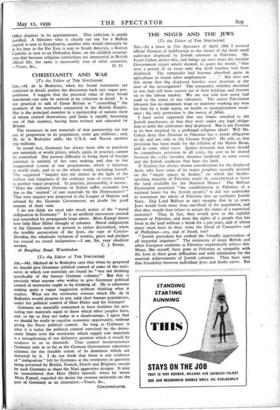CHRISTIANITY AND WAR
[To the Editor of THE SPECTATOR] SIR,—M. de la Bedoyere, when his broad statements are criticised in detail, pushes the discussion back into vague pro- positions. I suggest that the practical value of these broad
statements can only be arrived at by criticism in detail. It is not practical to talk of Great Britain as " controlling " the products of the territories comprised in the British Empire. She is the principal member in a partnership of nations most of whom control themselves, and India is rapidly becoming one of that number, having been trained and educated by Britain.
The resources in raw materials of that partnership are not out of proportion to its population, some 40o millions ; and, M. de la Bedoyere adds, the U.S.A. and Russia another 25o millions.
In actual fact, Germany has always been able to purchase raw materials at world prices, which, again, in practice, cannot be controlled. Her present difficulty in being short of foreign currency is entirely of her own making and due to her exaggerated system of war preparations, which is injurious to world trade, and so to the whole world, including herself. The suggested " inquiry into the matter in the light of the welfare and happiness of the ordinary man of every nation " is another vague proposal. In practice, presumably, it means : "Does the ordinary German or Italian suffer economic loss due to the ' control ' of raw materials by the Democracies? " That very inquiry was proposed in the League of Nations and refused by the German Government, no doubt for good reasons of their own.
I do not think we need take much notice of the " moral indignation in Germany." It is an artificial movement created and nourished by propaganda from above. Mein Kampf shows how little Herr Hitler thought of colonies. Moral indignation in the German nation at present is rather discredited, when the terrible persecution of the Jews, the rape of Czecho- Slovakia, the wholesale violation of treaties, pacts and pledges has roused no moral indignation.—I am, Sir, your obedient
servant, C. J. EYRES. Burghley Road. Wimbledon.


















































 Previous page
Previous page